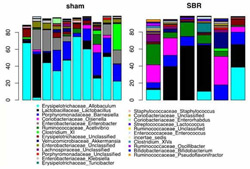|
Back to 2014 Annual Meeting Abstracts
Small Bowel Resection Induces Long-Term Changes in the Enteric Microbiome of Mice
Josh Sommovilla*, Yanjiao Zhou, Raphael C. Sun, Pamela M. Choi, Jose Diaz-Miron, Erica Sodergren, Barbara Warner, George Weinstock, Phillip I. Tarr, Brad Warner
Washington University, St Louis, St Louis, MO
Purpose
The enteric microbiome is known to play a major role in healthy gut homeostasis and several disease states. It may also contribute to both the intestinal recovery and complications (diarrhea, malabsorption, recurrent sepsis) that occur in patients with short bowel syndrome. This has not been well-studied in a controlled setting, and the purpose of this investigation is to characterize the effects of massive small bowel resection on the murine enteric microflora.
Methods
Wild-type C57BL6 mice underwent either 50% proximal small bowel resection (SBR) or a sham operation. Mice were sacrificed and enteric contents from small bowel, cecum, and stool were harvested at 7 and 90-days post-operatively. DNA was isolated, and the V3-V5 regions of the 16s rRNA gene amplified and pyrosequenced on a Roche 454 platform. Sequences were clustered into operation taxonomic units and classified. Communities were then analyzed for diversity and phylogenic composition.
Results
In the long-term group, he microbes inhabiting the ileum of mice undergoing SBR and sham operation differed significantly at the genus level (p<0.001). Cecal contents in these groups differed to a degree nearing significance (p=0.09). Small bowel contents collected before and after SBR also differed significantly (p=0.006). This was driven by an increase in Lactobacillus and decrease in Enterobacteriaceae species in mice undergoing SBR. No difference was seen in the stool long-term, or at any enteric site in the short-term. No difference in microbial community diversity was found in any group.
Conclusion
Bowel resection induces long-term changes in the microbial community of the murine small bowel that are attenuated in the cecum and absent in the stool. The increase in Lactobacillus encountered small bowel of resected mice correlates with limited previous studies. This may reflect an adaptive response to maximize energy extraction, but further studies are needed to establish causality.

Boxplot displaying bacterial species composition of small bowel luminal contents 90 days post-operation in mice undergoing either sham operation or small bowel resection (SBR)
Back to 2014 Annual Meeting Abstracts
|


